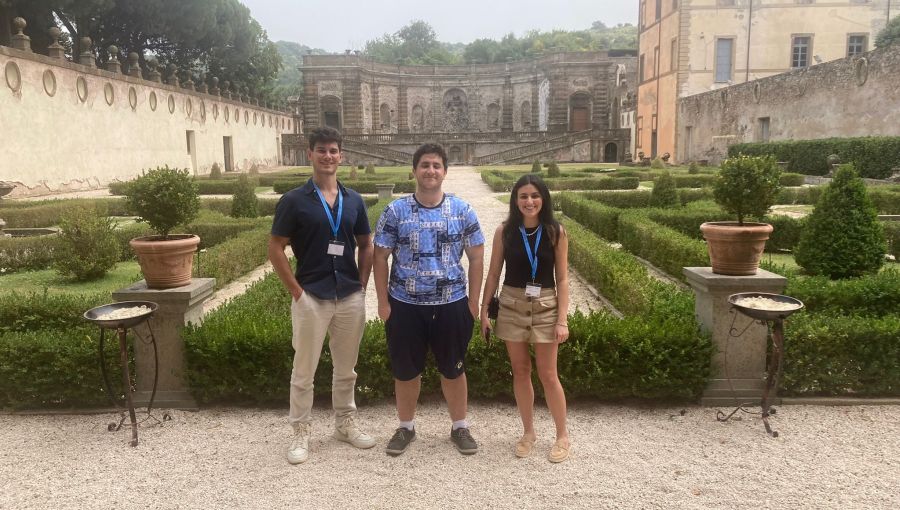Learning Beyond the Classroom: Alumna Katie Kehoe
Katie Kehoe was born and raised in Portland, Oregon. After graduating from John Cabot in 2018 with a double major in Italian Studies and Political Science, she moved back to Portland to live near her family and start working in early childhood education and outdoor education. She is currently waiting for admittance to a Master’s Degree in Teaching at Lewis and Clark College so she can teach science to young people.
What made you decide to move to Rome to earn your degree at John Cabot University?
When I was 18 and deciding what to do with my life after high school, I did not see a clear path for myself toward a career, but I knew I wanted to see the world outside of Portland. At that point, I had only traveled internationally once, on a trip to Italy with my mom when I was 12. She had always loved Italy and the romanticized idea of Italian culture. After seeing a John Cabot booth at a college fair, my mind was opened to the idea of pursuing higher education outside of the US. With my mom’s encouragement, I moved almost halfway across the world to attend John Cabot University.
You had a double major in Political Science and Italian Studies. How did you choose this combination? What did you enjoy most about these programs?
Upon arriving at JCU, I intended to study Political Science. Politics had been an interest of mine and, at the time, seemed like a degree with a path toward a career in social change. In my first semester, I took Italian 101 with Professor Elena Grillo. Prior to that class, I knew only the word “buongiorno” and pronounced it completely wrong (yes, like Brad Pitt). Professor Grillo was fun, encouraging, and cared a lot about her students. In my second semester, I continued to take Italian language and also took a class about the complexities of Southern Italy with Professor James Schwarten. Professor Schwarten’s class started to open my eyes to the Italy that tourists often do not see. I was fascinated that the concepts and vocabulary from class could immediately be utilized and observed everywhere around me. I quickly realized I wanted to learn as much as possible about Italy during the limited time I had there. Choosing to pursue a degree in Italian Studies was incredibly rewarding because learning always expanded beyond the classroom into everyday life. It was also a very humbling experience as I grew to understand that culture, even one as internationally exported as Italian, is full of paradoxes, rules, expectations, and traditions that an outsider could spend a lifetime unpacking and analyzing.
Tell us about the extracurricular activities you were involved in and what you learned from them.
During my time at JCU, I found community through extracurricular activities. In my freshman year, I restarted the dormant Queer Alliance and attended lots of different club meetings and events. I started working for the Office of Community Service and led students on volunteer opportunities to feed our neighbors in the Trastevere neighborhood. Later, I started working for the Writing Center and helped students brainstorm, edit, and make citations for their essays. For a few semesters, I worked as an Orientation Leader helping orient new students to a new school, city, and country. I also joined Student Government, which was a really fun way to work toward bridging the disconnect between the needs of students and the priorities of the administration. Because John Cabot has a small student body, there are lots of opportunities for individuals to join and start their own clubs, which makes meeting new friends really easy.
What do you remember most fondly about your time in Rome?
While I remember starting many weekends at Stazione Termini on my way to explore different towns along the peninsula, some of my fondest memories were in the classrooms at JCU with the dedicated Italian Studies professors. I will never forget Scontro di civiltà per un ascensore a Piazza Vittorio by Amara Lakhous, a book Professor Berenice Cocciolillo introduced to my Italian conversation class. I remember the afternoons with Professor Schwarten, picking apart and analyzing every word in the poems of Dante, Leopardi, Belli, and Pascoli. My mentor and advisor, Professor Federica Capoferri, spent hours helping me practice grammar and syntax, always gave honest advice and encouragement, and answered every question I had about things I had seen and heard. I felt very supported by the Italian Studies department in my pursuit of understanding Italian language and culture.
What are the advantages of doing an undergraduate degree at an American university abroad like JCU?
John Cabot University is full of dedicated professors and librarians who truly want to see their students succeed. It is a small community with many opportunities. The internationally diverse group of degree students brings valuable perspectives to every class in every department. Small class sizes allow for students to build rapport with professors. JCU is a place for future leaders to bring their perspectives, learn from others, make connections, and seize opportunities. JCU is not just an American education, it is an international education.
What are your plans for the future?
For the moment, I plan to become a middle-school science teacher in Portland. But someday I would love to come back to Italy and teach science in an international school.






